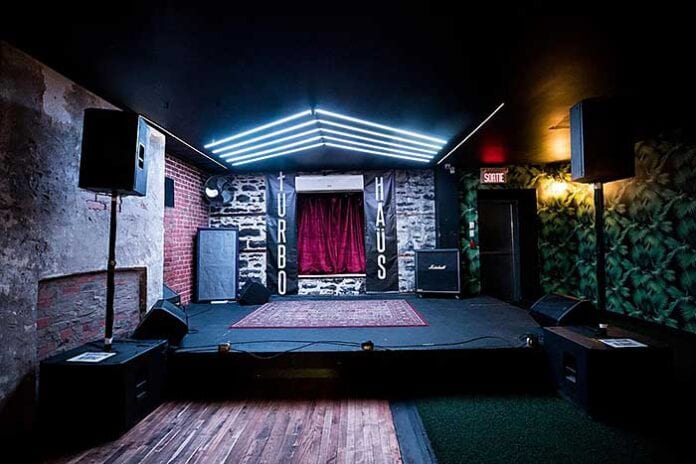
BY STEPHANIE JENSEN
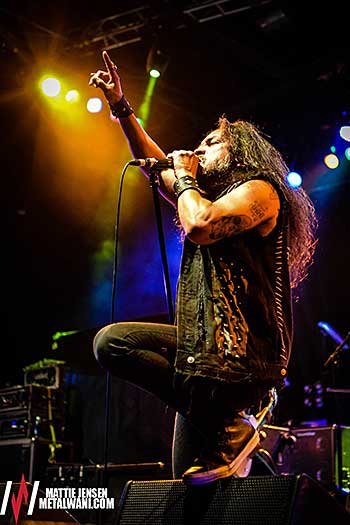
In February and March of 2020, European thrash fans got one of the best tours in history: The Bay Strikes Back European Tour. This tour was a collection of the Bay Area’s best and most legendary thrash bands: Testament, Exodus, and Death Angel. Unfortunately, the tour had many setbacks, such as multiple musicians being diagnosed with COVID-19, the deadly respiratory virus that’s sweeping the globe.
“I was tour managing Death Angel on that run. I’ve never been on a tour that was in ‘the news’ as much as I was on that tour. First the extreme exaggeration of a post being taken way out of context about ‘our truck going overboard’ on the ferry between Sweden and Finland in the storm, to being big news with our Milano show being the first big metal show canceled by the government due to the virus. Then, as everyone got home, [we] started getting tested. As everyone is likely aware, Will Carrol from Death Angel was on a ventilator for two weeks and it looked pretty dire. Luckily, he made it out and is very much on the mend,” explains Erin Lynch. Lynch owns A Flying Fox, an artist and event management company. Her roster includes Oranssi Pazuzu, Sólstafir, and Anna Von Hausswolff.
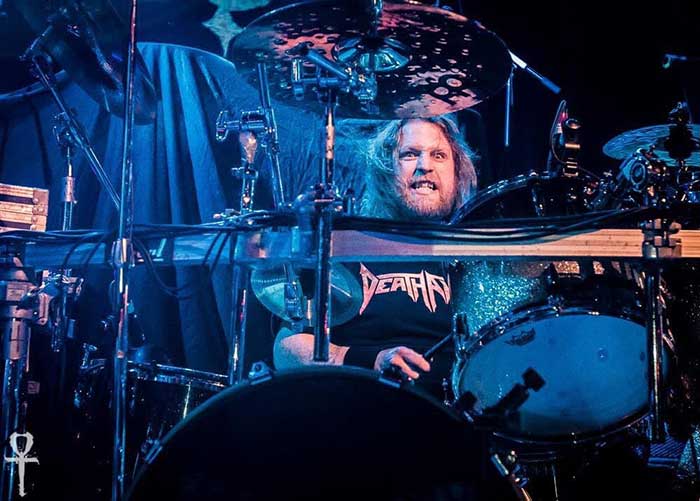
As well as Will Carroll, the other musicians on that tour who were diagnosed with the virus include Gary Holt of Exodus and Steve DiGiorgio and Chuck Billy of Testament. Lynch also explains that, “There were a few of us who also got sick on the tour, but were unable to be tested.”
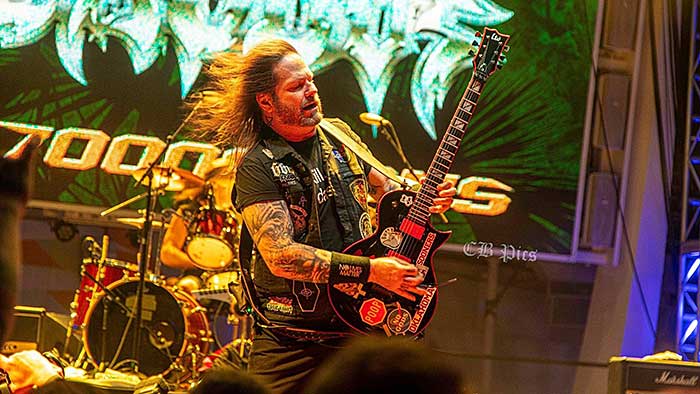
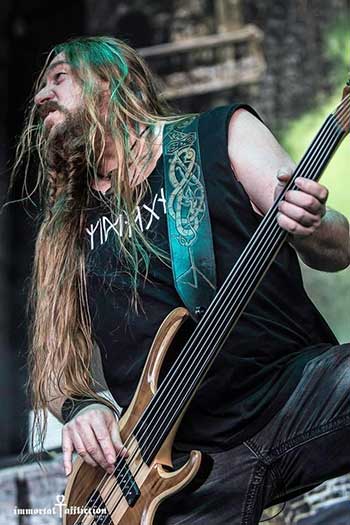
The coronavirus outbreak began in December 2019 in Wuhan, China. The coronavirus, named COVID-19, is a highly infectious virus that attacks your respiratory system. WebMD states that 4 out of 5 infected individuals only experience mild side effects and recover without medical treatment. Then you have those like Carroll, who was rushed to the hospital and placed on a ventilator. He was in a coma for 12 days.
Was everyone on the tour worried about getting the virus? Lynch explains that everyone felt the pandemic scare differently. “We just kind of passed it off as the inevitable tour flu that everyone eventually gets as a result of living in what is essentially, a metal tube incubator, ripe with funk.”
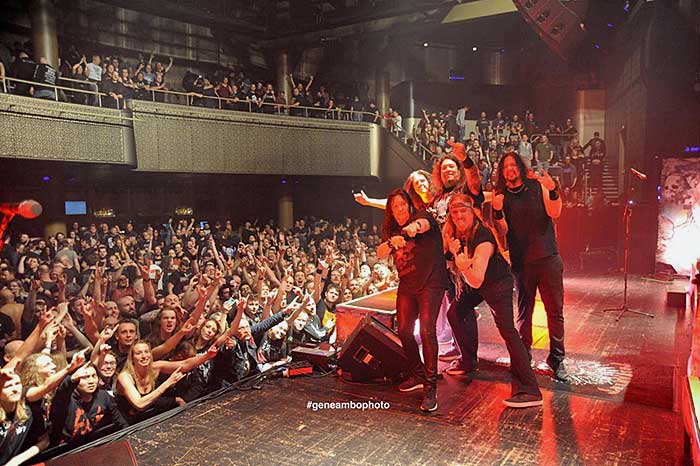
Robin Mazen agrees. “The tour was like any other tour. I knew about the virus a bit ahead of time because I have a friend that is a professor in China and I was chatting with him before the tour started in February about the virus and the news that was coming from there. Nothing was scary to me. We all get sick on tour. 50 people living together for 37 days, it happens. Even when they canceled Italy [and] started closing down France when we were there, it was just cases, no real deaths or anything being reported from what I recall. As it got closer to the end of tour, we figured the last show in Germany would be canceled and it was. Other than that, [the tour was] pretty normal to me. Sold out shows everywhere.”
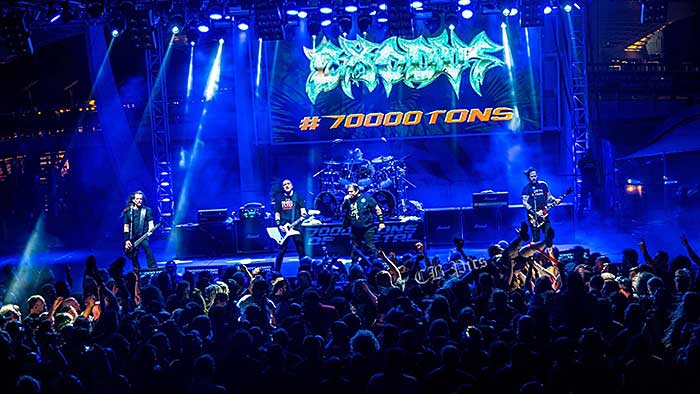
Mazen has worked just about every job that exists in the touring industry. She’s also a bassist and plays in Gruesome, Castrator, and Derketa. Mazen is Exodus’ manager and was their tour and merchandising manager on that tour.
Many countries enacted lockdowns and stay at home orders to prevent the spread of the virus. This made travel difficult. Not only were borders closing, but also finding a flight was impossible during this time. These individuals out on tour weren’t only concerned about getting the virus, but they were wondering if they would be able to make it back home.
This was definitely the case with the Bay Strikes Back tour. On March 11, US President Donald Trump closed American borders to most European countries. “I knew I’d have no problems getting back into Sweden. But the guys flying back to the States were most certainly on edge. Especially since it had been announced just a few hours before [that] flights were scheduled to depart on Thursday, that the borders to the US would be closed on Friday without a whole lot of real information on what that meant for US citizens returning home,” says Lynch. “A few of the guys also presented with symptoms of some sort of sickness, whether just the usual end of tour sickness/burnout, or potentially COVID-19. There were so many stories floating around about people flying in from Europe being put directly in quarantine upon entering the US, that [made] everyone a bit on edge, I suppose. But again, I wasn’t scared about being able to get home…no flights were rebooked. Everyone took their regularly scheduled flights home. The last day of the tour in Hannover was canceled, but we made plans to go to the backline company, with power and parking for the buses, and just spent the extra night there. As you can imagine, [two] canceled shows on the tour results in a financial hit. Changing the flights would have been an unnecessary cost.”
While Lynch lives in Sweden, a large percentage of the bands and crew live in the US. “The last show in Germany got canceled, so we just stayed in Germany for the extra day. [We] all went out to dinner, packed, and took our regular flights home. The only thing was that night we were hearing about the travel ban. But it took place 24 hours later, supposedly, so none of that was scary. I was worried for one of the crew who was from Italy. But, no issues there, either,” explains Mazen, who lives in Florida.
The Bay Strikes Back European Tour wasn’t the only tour impacted by COVID-19. Lynch represents several bands whose tours were all canceled. “I run a management company [FlyingFox AB], so this outbreak was [and did] definitely going to affect myself and my bands/artists big time, with three full tours booked for three different bands/artists, and 22 summer festivals between all of the acts.”
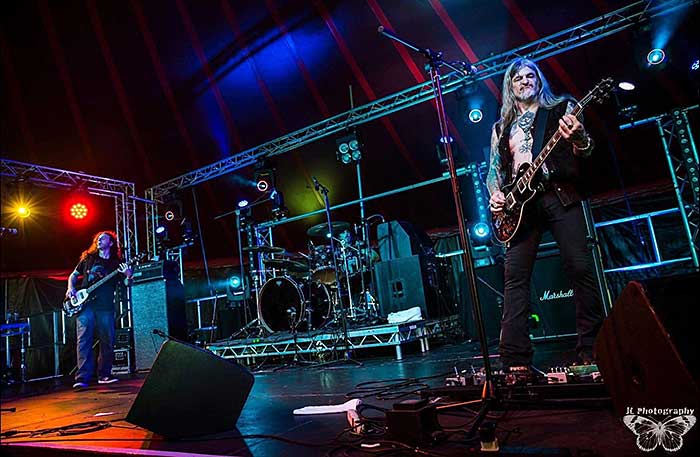
Zachary Ohler and his artists were also hit hard by the virus. “I was on tour with The Obsessed, and it ended March 10th, really right before everything shut down. Today Is the Day, whose tour I booked, they were in Texas in Austin March 13th, and that’s when everything started to shut down, so they lost 20 shows and had to drive back to the northeast from Texas. Eyehategod had their European tour cut by a few shows due to the circus surrounding the travel ban when it first got announced.” Ohler owns Extremity Retained Booking and his roster includes Eyehategod, Pentagram, The Obsessed, Today Is the Day, Child Bite, The Skull, and more. Ohler also tours, working as a tour manager, merchandising manager, and driver.
As a result, many touring careers are impacted by the virus, including Lynch’s career. “I’m also backstage manager for [three] European Festivals, which is another source of income for me, so I was paying very close attention [to the news].”
She continues with this valid point. “Many of us in the industry will not receive a penny of financial assistance. My life’s work has been impacted on scales that will take a long time to recover from, at best. Now, more than ever, we need to find a way to band together and start looking at alternative ways to keep live music thriving. Not just for those of us directly affected by this, but also for everyone else. Live music is, believe it or not, crucial on multiple levels. Our sector was the first to be closed down and will be the last to reopen.”
BANDS ARE REACTING
How are bands handling the pandemic? Dirty Honey is one of the bands that has been impacted severely by the virus. The rising act had many cancellations in a short amount of time, On March 16, they were supposed to shoot a music video for their single “Heartbreaker” at the Avalon Hollywood Nightclub and were supposed to fly to Australia the next day to write and record new music. The day right before their video shoot, Los Angeles Mayor Eric Garcetti closed all venues as well as movie theaters, nightclubs, and more. Australia also closed their borders to non-Australians, preventing the band from writing and recording their new album. Dirty Honey also had several spring show cancellations. They also have a European tour booked in June, and it’s unclear whether or not that tour will happen.
“The initial response was, I think, first disbelief that everything was really going to close. And then the next response was disappointment, for sure. But quickly after that, I think the third realization was we finally have more time to hone our record [and] polish the songs,” explains Dirty Honey guitarist John Notto.
Because of the cancellations, Dirty Honey has been writing and demoing new songs. Since they can’t fly to Australia, they have been having Skype meetings with their producer, Nick DiDia (Rage Against the Machine, Pearl Jam). “Once [Australia] was canceled, we had time to take a look at a lot of ideas that we probably wouldn’t have been able to [work on],” explains Notto.
Like many bands, Dirty Honey has been using their creativity and the internet to prevail. Dirty Honey vocalist Marc LaBelle had the idea for the Suitcase Sessions, where they pack up all of their gear into a suitcase and film performance videos. The first video they put out is an acoustic performance of “Heartbreaker.” “[Marc] has been talking about doing the Suitcase Sessions for a few years now. He was talking about doing it before we had anything going, it was some secondary idea he had.”
The video shows the entire band in front of a picturesque mountainous setting. Everyone has acoustic instruments and LaBelle’s voice organically rings loud and clear. The acoustic performance gives new life to the “Heartbreaker” single. And the gorgeous scenery makes the video shine even more. “As far as the location of that video, that was also Marc’s idea. He does a lot of motorcycling, so he just knows those types of locations that are very pretty and mountainous, all up and down the [west] coast.”
Fortunately, the shows they had planned will be rescheduled, but it’s still unclear whether or not Dirty Honey will fulfill them.
“That has been a case-by-case situation. A lot of our dates that we had happening in the spring have been individual radio festivals, with some headlining dates. A lot of them have been rescheduled, either for next fall or for the following year.” Notto also adds, “It will depend on what we have going, whether or not we will be able to play some of those rescheduled dates.”
THE CLOSURE OF VENUES AND BARS
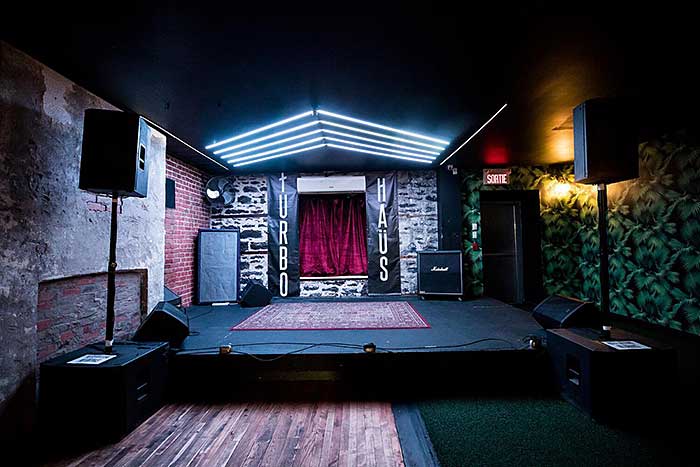
One of the many questions that fans will ask is when regular touring will happen again. But first, we need to have venues and bars for bands to play. “Bars and venues were the first places to close, and it is more than likely that we will be the last to reopen. The longer this drags out, the more difficult it will be to recover.” states Michelle Ayoub. Ayoub owns Turbo Haus in Montreal, Quebec, and she also works as a production manager for other shows and events. Ayoub states her venue has completely shut down operations during the COVID-19 pandemic. This action was enforced by the provincial government, ordering the closure of all bars, venues, and pubs. She expects the closure will be temporary, but still isn’t sure when the venue will be open.
Ayoub explains her venue lost over two months’ worth of shows. She also explains these next two to three months are her busiest season. As well as booking her own shows, she also loses rentals and more income from many canceled summer festivals in Montreal. And these impacts may extend for months after the summer season. She adds, “Tours as far ahead as this fall have also pulled their dates due to the uncertainty of touring and borders reopening.”
She continues, “The pandemic will no doubt have huge long-term effects. We are already seeing venues, bars, and restaurants closing down. We are still pretty early into this whole situation, so that number will surely increase exponentially, internationally. The touring industry will take even longer to recover. And for the venues that will survive the shutdowns, when they reopen, they will have to face the reality that international touring may take a while to pick up again. So even when the venues can reopen, there is still a long road ahead.”
This lost revenue also comes from her job as a production manager. Her work is canceled from now until September, many of these jobs included major summer festivals.
Unfortunately, no venue is safe from the economic impact of COVID-19. Ayoub explains, “There will definitely be a long-term impact for venues of all sizes. Obviously, smaller spaces, DIY & underground [venues] will have the hardest time recovering, but larger and corporate venues are also taking a massive hit.”
WHAT PROMOTERS ARE SAYING
Local promoters are also facing serious burdens. “The virus has impacted all of my events. I’ve honestly lost count of how many, but my spring was packed with great shows and obviously they’re gone. Either postponed or canceled. Many shows over the summer have moved, as well, along with shows that were confirmed but not announced,” explains Kimberly LaRowe. LaRowe owns 13th Floor Entertainment and books concerts at Club Red in Mesa, Arizona.
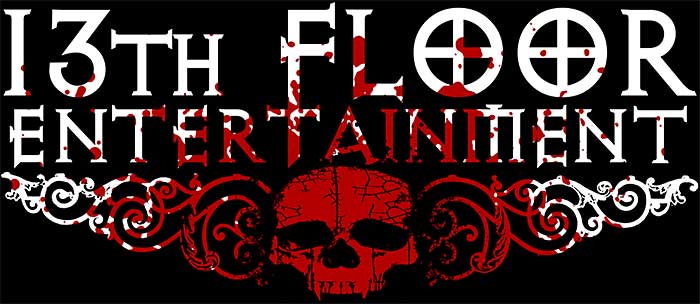
Even when venues and bars reopen, this also doesn’t guarantee we will get shows back. Michelle Ayoub reminds us of this solid point. “The other question being, when we reopen, will we be allowed to put on shows? How will social distancing rules come into play. The uncertainty is beyond frustrating as we do not know any details on the if, when, or how of anything.”
LaRowe adds, “Even if we get the okay to reopen venues, regardless of their capacities, touring, as a whole, has been hit so hard. Borders are closed, international travel is frozen. People do not realize how much time, effort and money goes into planning tours, so when things do start rolling again, it will take months, if not longer, for the machine to be running again, and I believe it will take longer still for it to be even close to the capacity it was when shit hit the fan.”
There has been a lot of controversy when it was said that concerts wouldn’t return until fall of 2021. This was a statement made by Zeke Emanuel, the director of the Healthcare Transformation Institute at the University of Pennsylvania. Is this true? Fortunately, this may only impact festivals and large shows and tours.
“This is definitely speaking towards the larger shows in arenas and festivals. Really, anything over probably 1,500 might not come back this year,” explains Zachary Ohler.
Even with these points, the future is still unclear. “I don’t know if 2020 is a complete loss for all events and really I don’t think [anyone] does,” explains Joey Bee. Bee is the organizer for Illinois based open-air metal festival Full Terror Assault (FTA).
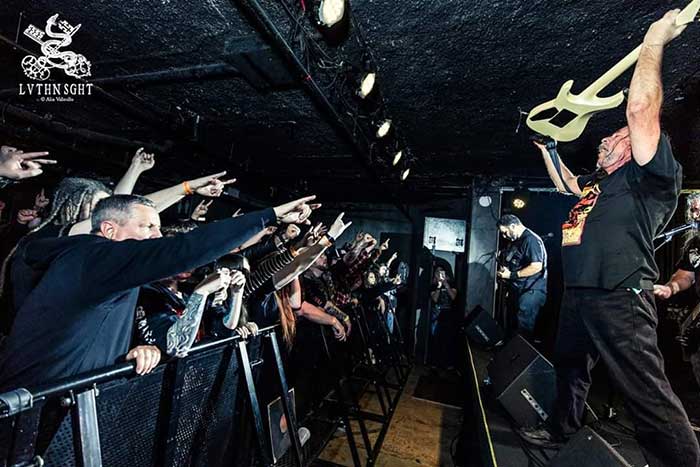
Amos Rifkin agrees, “I’m not speculating or buying into speculation from ‘experts’ about when this will blow over and if/when we can go back to work. Nobody is more or less informed than the next person, so all these people putting a timetable on when things can go back to normal gives off a real sense of self-importance, like they know something we don’t, which just isn’t the case.” Rifkin is the co-organizer for Atlanta based Mass Destruction Festival and also works as a talent buyer.
Even with the warning that we won’t get festivals and large shows until fall 2021, many 2020 festivals are continuing. Bee states that, as of now, FTA hasn’t been canceled. “We have not canceled anything yet and are optimistic that the event will still happen, considering it is still about five months away, and I really think we are close to beginning to return slowly to work, restaurants, etc. Indoor concerts and sporting events could lag a bit, but FTA is an open-air setting, so I really believe it will happen.”
Rifkin states Mass Destruction hasn’t been canceled, though he’s really hoping the festival can continue this year. Since the festival isn’t scheduled until November, there is still a chance, though he is remaining realistic. Rifkin also explains some of the shows he booked have already been rescheduled for the fall. However, he also adds “…but there’s no telling if any of it will happen.”
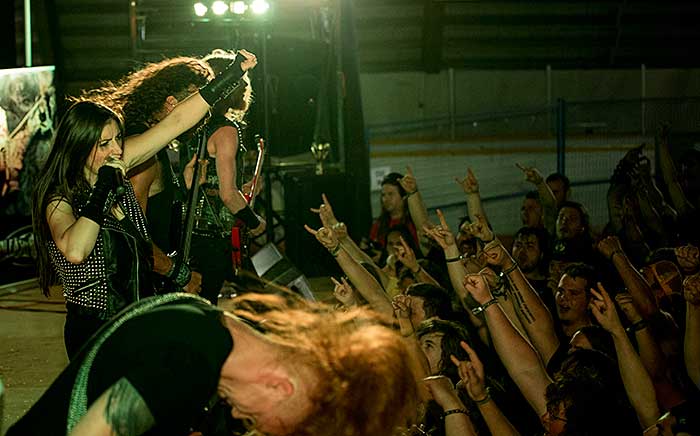
While FTA and Mass Destruction are persevering for now, summer festivals have come to a halt. This impacted many festivals, such as Armstrong Metalfest. “At this moment we have only received vague statements from our government saying it probably won’t happen. So, we are freezing operations until mid May to make a final decision. It’s likely we will have to cancel, but without a concrete call from the government, our planning group doesn’t feel it’s the right to take that direction,” explains Armstrong Metalfest co-founder Jesse Valstar.
Valstar also explains he won’t give up, even if Armstrong Metalfest 2020 is canceled. When asked about the possibility of concerts not returning until 2021, he explains, “It’s a possibility for sure. But that doesn’t mean we have to just hang up our hat and call it a couple years. These events are important economic drivers for the local economies as well as the vendors and bands who play them. They are key spots for people to make networking connections. So, to hear that major festivals won’t return [until] fall of 2021 and give up all hope for 2020 and for 2021 is a hard one. 2020 is likely not going to happen, and I may waste a bunch of my time setting up 2021, but I am going to try.”
WHEN WILL SHOWS AND TOURING START
But what about regular touring? Many professionals in the industry have different responses. But most can agree on one thing: we really don’t know. “No one has any real firm idea when touring will begin again. It’s speculation at best,” explains Vince Edwards of Metal Blade Records.
Not only is there a lot of speculation, different dates are thrown around and it’s difficult for industry professionals to know who or what to trust. Michelle Ayoub agrees, “There is talk now that the Aug 31st date is for large outdoor events, and not applicable for indoor shows, which may reopen as early as May 2020. This seems to change every other day, though, so we are not holding our breaths, and frankly are preparing for the worst.”

When asked how the pandemic will affect future touring, Erin Lynch explains, “Not well. What’s happening now is definitely putting a huge dent in the touring and live music ecosystem, if you will. This would be a 12 page essay if I was to write about the full impact, but I will try to keep it brief. A lot of people are going to lose a lot of money. A lot of companies are going to go bankrupt. A lot of bands will likely, just call it quits as a result of the hardships that lie ahead. I’m not talking about the baby bands or the arena bands, although there is no doubt that many will be hit hard. I’m talking about everyone in between, more significantly, on the 800–3,000 capacity level, which is a freaking lot. Bands that have worked so hard to establish themselves over the years are going to likely need to take huge fee cuts, just to get a gig. This means that the touring budgets will need to be much smaller. Which, of course, means scaling down production quite significantly. This will in turn, put a lot of sound and light companies out of business. Then there are the loyal crew members. Who is essential? Well, everyone, but that’s not really what it comes down to. Bus and trucking companies will lose loads of business as productions get smaller. And as it seems in Europe, each country is making their own rules at their own pace, much like America seems to be on the verge of with some states choosing to open while other ones close. Routing a tour is going to be very difficult. Or, for example, if a festival is booked in the middle of a tour, and that gets canceled due to capacity being over whatever the magic number is in that country, then again, the tour needs to be rerouted, or maybe even canceled, as festivals on a tour for bands at this level usually help significantly pay for the tour.”
Lynch just started a blog, http://www.ventingpost16.com, where other touring professionals in the music industry will comment on the pandemic and the state of the music/touring industry.
Other individuals in the industry are hopeful, including booking agents. “I think touring is going to at least attempt to start up again in August,” states Zachary Ohler. “I’m currently booking stuff for the bands I represent. Some of it starting late August, some not until October or December. I think with governors starting to reopen things starting here in late April, depending on how things go with COVID, I think early fall is a good timetable to try and bring shows back. That said, it’s still such a fluid situation, things could definitely change.”
Even though timetables aren’t set in stone, others still believe shows will begin again in 2020, such as Kimberly LaRowe. “Many believe that venues and touring are done until 2021, but that would be a disaster for this whole industry. What would a US tour look like at that point? How many venues could weather the storm?”
LaRowe continues, “I believe touring will begin regionally. Honestly, fans want to go out and see live music. But moreover, many of them would like to support the venues and staff that have been out of work. Bands are also itching to get out and play. I’m pretty optimistic.”
But Kimberly LaRowe also emphasizes the importance of safety and social distancing. “I think it’ll be a slow reopening and that venue caps will change so they can accommodate social distances. I also think venues might even take your temp going forward. This is all up until there’s a vaccine. Then I believe things will find some sense of normalcy of some sort.”
Erin Lynch is also trying to stay optimistic for Europe’s market. “I have to believe, for my own sanity, that in Europe, 500 capacity venues or less will be allowed to open and have shows in September. It’s hard to say when things will go back to normal for anything bigger. We’re all planning. We’re optimistic. We’re desperately hoping that what’s happening now, will be a thing of the past this time next year. But so much is dependent on a billion other things.”
Bands can also agree that shows and festivals will come back, if not now then in the future. Dirty Honey’s John Notto has a lot to say on this topic. “I don’t think this will last forever and I don’t think we can hold people back forever. Certainly, I think we should do it for whatever time [is] necessary. I’m not anti-quarantine as we started to see recently. I believe that the talking heads are wrong about ‘this will change how we commune forever or for many years.’ I don’t see that happening. As soon as we have the vaccine, let’s get back to it, baby!”
SHOWS MATTER
Music fans should stay realistic. The pandemic shook the entire globe, and we must do what we can to keep everyone safe. This means halt touring and put a pause on live shows, as well as any other situation where large crowds gather. However, there is hope. Fans want to see a show and bands want to tour. Touring is a huge economic drive for the industry and venues deserve the support.
We can all agree that there’s nothing in the world like experiencing music in a live setting, and the music scene is a community and music fans feel like a family. “We have a lot of devoted fans that book multiple shows on our tours to come see us. They are very disappointed now to not see us. They’re concert going people. They go see a lot of bands, not just us. They’re fans of rock music, in general,” explains Dirty Honey’s John Notto.
There’s nothing in the world like a live show. And Jesse Valstar explains it best. “There is so much to a live music event. It’s not just about the music. It’s the people, the feeling of being out.”
FANS CAN SUPPORT BANDS DURING THE PANDEMIC
Major scale touring and festivals are at a halt, and it’s undetermined how long this will go on. There are still many ways that fans can support their favorite bands. Bands and musicians have been emphasizing buying merch and music to sustain the industry financially. If fans purchased concert and festival tickets and the event is rescheduling, fans are also urged to save their tickets and attend the rescheduled event rather than ask for refunds. Connecting with your favorite bands and musicians digitally is another way to show your support. Major metal labels, such as Metal Blade Records, are encouraging their artists to harness the power of social media, streaming platforms, and crowdfunding.
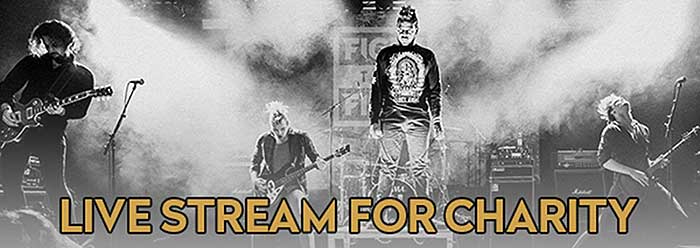
Vince Edwards has a lot to say on this topic. “We’re really working overtime on trying to get artists set up with streaming and services like Patreon, Streamlabs, etc. Fans want to support artists, so the easier that artists make it for fans to help, the better. And the most valuable resource anyone has is time, so artists exchanging their time on Twitch, Instagram, Periscope, etc. is, and has always been, one of the best ways for a band to promote their work by interacting directly with fans everywhere. At Metal Blade, we’ve created a document that contains a list of links to resources, how to’s, and general information on what artists can do right now to reach their fans via streaming. The Twitch community, in particular, is really welcoming to new streamers from the metal world. I could be overthinking, but I’ve really felt that some artists are hesitant to start a streaming/live broadcast schedule due to negative comments being so prevalent on social media, but I’ve found streaming to be a largely positive community.”
Dirty Honey understands the importance of social media and agrees that this is the best way to connect with fans during the pandemic. “It’s just really important to the fans to have some sort of consistency. A lot of fans that were planning on seeing us now can’t see us. We had a really good schedule that was wiped off for now. The only way they can see us is via live feed, via Facebook Live videos, and some sort of thing we can do without risking our health too much. I think any band that has an active audience, it’s very important for them to stay engaged,” explains John Notto.
One of the social media events they did recently was a livestream in collaboration with Harley Davidson. “When we did our last Harley Davidson partnership, it was so much fun playing it. We were all laughing and smiling more than we ever had,” explains Notto.
Michelle Ayoub also believes supporting our local scene will help support venues. “I’m hoping that the local scenes and markets will step up to help keep venues alive, but the entire population has been hit so hard.”
Zachary Ohler agrees. “The smaller shows are the first thing we will see come back, and it’s a first step to bringing back the larger events.”
Another reason why we must keep the local music scene alive is the virus affected regions differently. Kimberly LaRowe has this to say about Arizona. “While I’ve been hearing lots of doom and gloom, our peak in Arizona should be around April 30th, so it’ll be a wait and see until it goes down. We have to have testing and a downward slope before anything can resume.”
FUNDRAISER FOR TOURING MUSICIANS AND CREW MEMBERS
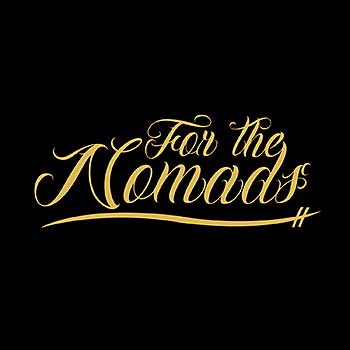
Fortunately, fans have another option. One month ago, during the start of the pandemic, Frank Fanelli founded the fundraiser, For the Nomads. For the Nomads helps professionals who make touring their living. The fundraiser was founded as a response to those who are out of work for an undetermined amount of time.
In only one month, For the Nomads raised over $30,000. “When I had this idea to create something to help my fellow crew members, I figured we’d gain a little bit of buzz, and my immediate friends would obviously share it around once or twice so we could get that feel good moment. What I didn’t expect was to raise $12,000 in the very first day and have literally hundreds of people all over the world getting a hold of us telling us it was an amazing idea because they haven’t seen someone doing anything like that yet. Very humbling, to say the least. I have no shame in saying that I sat back in my chair alone in my office and cried happy tears at least once or twice. It shows me that, just like a touring crew on the road, everyone can work together to achieve a goal. If you work like a team, you can win like a team.”
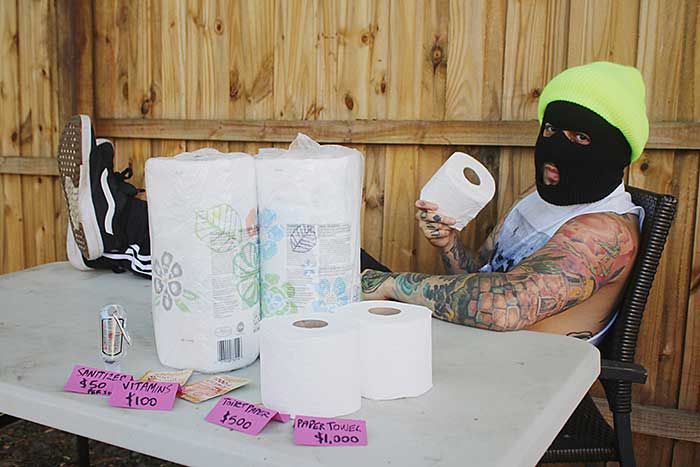
Fanelli also has a successful career in the music industry. He used to sing in the band The World We Knew. After the band dissolved, Fanelli started working as a tour manager, merchandiser, and production manager. His tour résumé includes acts like Sepultura and Hatebreed all the way to Black Veil Brides, We the Kings, and even Bam Margera. Fanelli’s humbling response proves that, in the wake of a catastrophic event, the music industry and music fans will always be there to support one another.
You can donate to For the Nomads on their website or on their GoFundMe. Fanelli also owns C.A.T Clothing and created a face mask, which comes with a donation to the organization. If you’re a touring professional that can’t find work and would like assistance from For the Nomads, visit their contact page. As of now, they hit their limit on applications, but their contact page also provides other relief options for touring professionals.
The next question is, will For the Nomads continue supporting workers after the pandemic is over and touring resumes? “I’ve had a couple of conversations with some close friends on how we could potentially keep this brand alive in the future, and I definitely think it’s a possibility. If anything at all, this quarantine is teaching us how to become more creative with our time, and I feel my partner and I can come up with some great ideas to make sure more crew personnel gets the help they deserve whether this pandemic is active or not. I’ve been saying since day one of For the Nomads, if we use our platforms for good to spread the word about things we care about, you never know who’s watching. It could truly affect a lot of lives for the better.”
A DOSE OF POSITIVITY
Something else we can do is look to the future and find new opportunities. This is especially important for bands, specifically up-and-coming acts like Dirty Honey. “I think it will cause new opportunities. I think we’ve been forced to think differently during this virus, in regards to live streaming,” explains John Notto. “Afterward, I think there will be an eager sense to commune again. I think our music, that we already released and are working on, is very geared toward a positive, fun, and high-energy good time. And I can’t imagine anyone who’s not gonna be up for that after this quarantine (laughs).”
Notto also has advice for other bands. “I just hope that all of the bands out there stay active. Use this time to write, hone your craft more, and plan to break out like a freshly free, caged tiger.”
If all else fails, positivity can do us wonders. As Joey Bee perfectly states, “Hang in there everyone. And remember, every brainiac all over the globe is working 24/7 to get this problem solved and everyday we get closer to seeing our favorite bands again.”




















